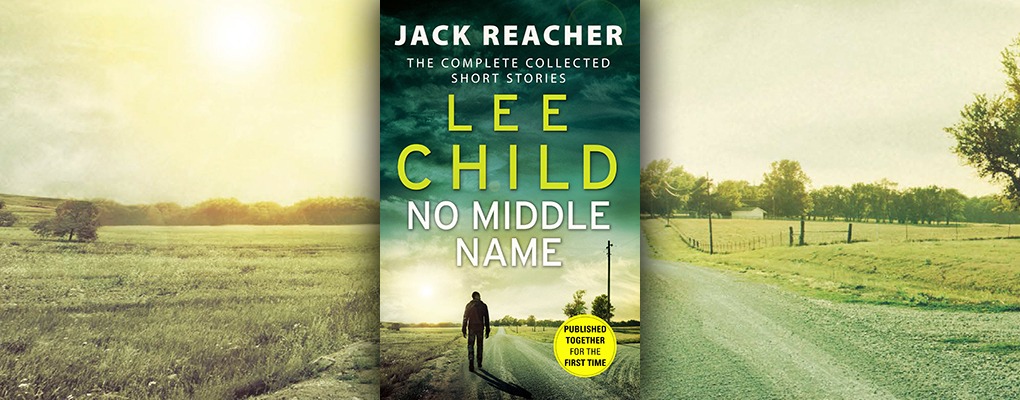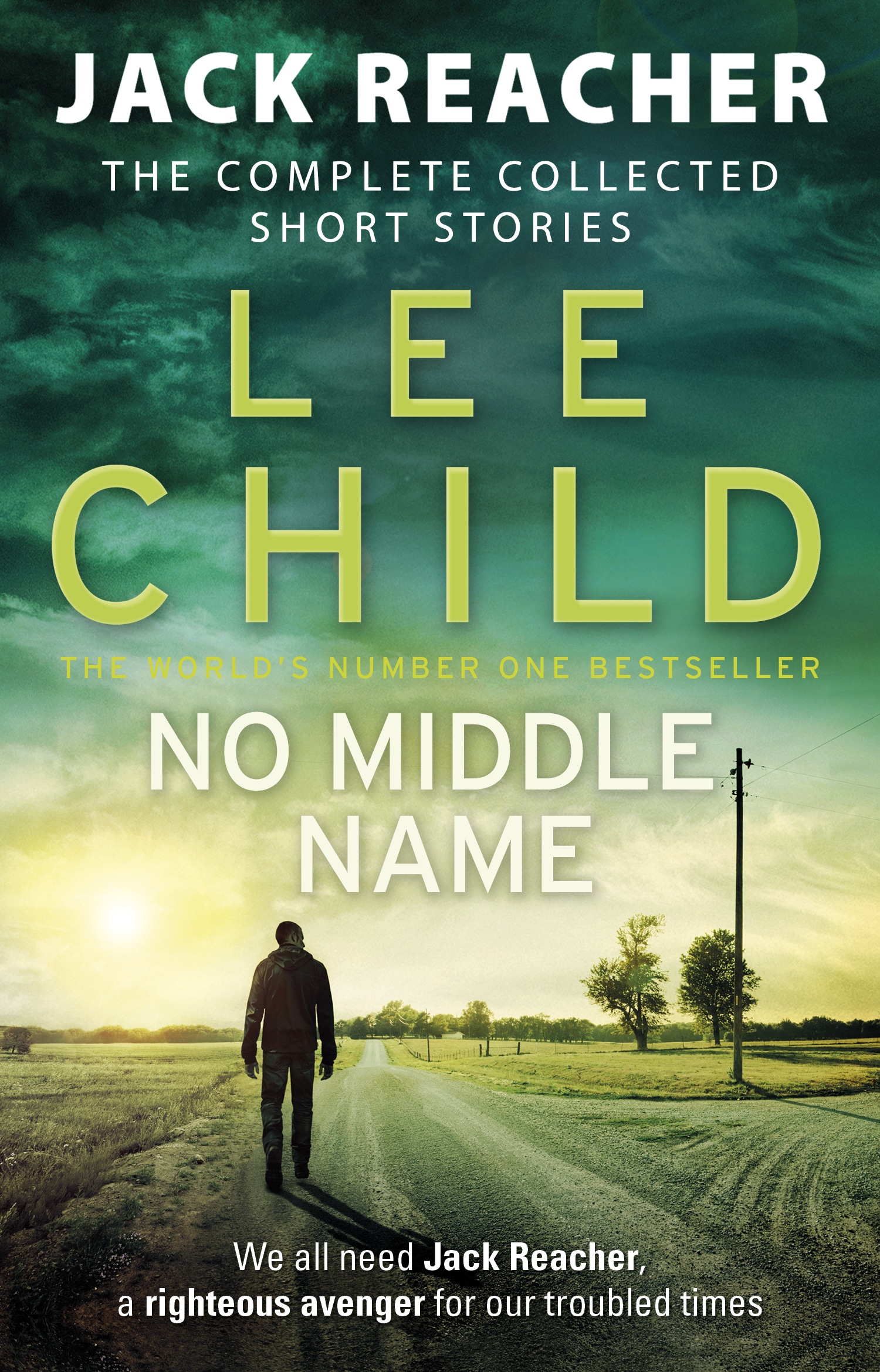Books
Extract: No Middle Name by Lee Child
Have we got a treat in store for you today, dear readers – a taster from No Middle Name, the complete Jack Reacher short story collection from the number one bestseller and Dead Good favourite Lee Child!
Jack ‘No Middle Name’ Reacher – lone wolf, knight errant, ex-military cop, lover of women, scourge of the wicked and righter of wrongs – is the most iconic hero for our age. This is the first time all Lee Child’s shorter fiction featuring Jack Reacher has been collected into one volume. Read together, these twelve stories shed new light on Reacher’s past, illuminating how he grew up and developed into the wandering avenger who has captured the imagination of millions around the world.
The twelve stories include a brand new novella, ‘Too Much Time’, as well as ‘Second Son’, ‘James Penney’s New Identity’, ‘Guy Walks Into a Bar’, ‘Deep Down’, ‘High Heat‘, ‘Not a Drill’ and ‘Small Wars’, which have, until now, only been available as ebook shorts. Added to these is every other Reacher short story that Child has written – ‘Everyone Talks’, ‘Maybe They Have a Tradition’, ‘No Room at the Motel’ and ‘The Picture of the Lonely Diner’.
Read on for a taster from ‘Too Much Time’ – the brand new story featured in No Middle Name!
No Middle Name
by
Lee Child
TOO MUCH TIME
Sixty seconds in a minute, sixty minutes in an hour, twenty-four hours in a day, seven days in a week, fifty-two weeks in a year. Reacher ballparked the calculation in his head and came up with a little more than thirty million seconds in any twelve-month span. During which time nearly ten million significant crimes would be committed in the United States alone. Roughly one every three seconds. Not rare. To see one actually take place, right in front of you, up close and personal, was not inherently unlikely. Location mattered, of course. Crime went where people went. Odds were better in the centre of a city than the middle of a meadow.
Reacher was in a hollowed-out town in Maine. Not near a lake. Not on the coast. Nothing to do with lobsters. But once upon a time it had been good for something. That was clear. The streets were wide, and the buildings were brick. There was an air of long-gone prosperity. What might once have been grand boutiques were now dollar stores. But it wasn’t all doom and gloom. Those dollar stores were at least doing some business. There was a coffee franchise. There were tables out. The streets were almost crowded. The weather helped. The first day of spring, and the sun was shining.
Reacher turned into a street so wide it had been closed to traffic and called a plaza. There were café tables in front of blunt red buildings either side, and maybe thirty people meandering in the space between. Reacher first saw the scene head-on, with the people in front of him, randomly scattered. Later he realized the ones that mattered most had made a perfect shape, like a capital letter T. He was at its base, looking upward, and forty yards in the distance, on the crossbar of the T, was a young woman, walking at right angles through his field of view, from right to left ahead of him, across the wide street direct from one sidewalk to the other. She had a canvas tote bag hooked over her shoulder. The canvas looked to be medium weight, and it was a natural colour, pale against her dark shirt. She was maybe twenty years old. Or even younger. She could have been as young as eighteen. She was walking slow, looking up, liking the sun on her face.
Then from the left-hand end of the crossbar, and much faster, came a kid running, head-on towards her. Same kind of age. Sneakers on his feet, tight black pants, sweatshirt with a hood on it. He grabbed the woman’s bag and tore it off her shoulder. She was sent sprawling, her mouth open in some kind of a breathless exclamation. The kid in the hood tucked the bag under his arm like a football, and he jinked to his right, and he set off running down the stem of the T, directly towards Reacher at its base.
Then from the right-hand end of the crossbar came two men in suits, walking the same sidewalk-to-sidewalk direction the woman had used. They were about twenty yards behind her. The crime happened right in front of them. They reacted the same way most people do. They froze for the first split second, and then they turned and watched the guy run away, and they raised their arms in a spirited but incoherent fashion, and they shouted something that might have been Hey!
Then they set out in pursuit. Like a starting gun had gone off. They ran hard, knees pumping, coat tails flapping. Cops, Reacher thought. Had to be. Because of the unspoken unison. They hadn’t even glanced at each other. Who else would react like that?
Forty yards in the distance the young woman scrambled back to her feet, and ran away.
The cops kept on coming. But the kid in the black sweatshirt was ten yards ahead of them, and running much faster. They were not going to catch him. No way. Their relative numbers were negative.
Now the kid was twenty yards from Reacher, dipping left, dipping right, running through the broken field. About three seconds away. With one obvious gap ahead of him. One clear path. Now two seconds away. Reacher stepped right, one pace. Now one second away. Another step. Reacher bounced the kid off his hip and sent him down in a sliding tangle of arms and legs. The canvas bag sailed up in the air and the kid scraped and rolled about ten more feet, and then the men in the suits arrived and were on him. A small crowd pressed close. The canvas bag had fallen to earth about a yard from Reacher’s feet. It had a zipper across the top, closed tight. Reacher ducked down to pick it up, but then he thought better of it. Better to leave the evidence undisturbed, such as it was. He backed away a step. More onlookers gathered at his shoulder.
The cops got the kid sitting up, dazed, and they cuffed his hands behind him. One cop stood guard and the other stepped over and picked up the canvas bag. It looked flat and weightless and empty. Kind of collapsed. Like there was nothing in it. The cop scanned the faces all around him and fixed on Reacher. He took a wallet from his hip pocket and opened it with a practised flick. There was a photo ID behind a milky plastic window. Detective Ramsey Aaron, county police department. The picture was the same guy, a little younger and a lot less out of breath.
Aaron said, ‘Thank you very much for helping us out with that.’
Reacher said, ‘You’re welcome.’
‘Did you see exactly what happened?’
‘Pretty much.’
‘Then I’ll need you to sign a witness statement.’
‘Did you see the victim ran away afterwards?’
‘No, I didn’t see that.’
‘She seemed OK.’
‘Good to know,’ Aaron said. ‘But we’ll still need you to sign a statement.’
‘You were closer to it all than I was,’ Reacher said. ‘It happened right in front of you. Sign your own statement.’
‘Frankly, sir, it would mean more coming from a regular person. A member of the public, I mean. Juries don’t always like police testimony. Sign of the times.’
Reacher said, ‘I was a cop once.’
‘Where?’
‘In the army.’
‘Then you’re even better than a regular person.’
‘I can’t stick around for a trial,’ Reacher said. ‘I’m just passing through. I need to move on.’
‘There won’t be a trial,’ Aaron said. ‘If we have an eyewitness on the record, who is also a military veteran, with law enforcement experience, then the defence will plead it out. Simple arithmetic. Pluses and minuses. Like your credit score. That’s how it works now.’
Reacher said nothing.
1 Comment
Join the discussion
Please note: Moderation is enabled and may delay your comment being posted. There is no need to resubmit your comment. By posting a comment you are agreeing to the website Terms of Use.



I love Lee child his books are hard to put down, I can’t wait to get another book soon.